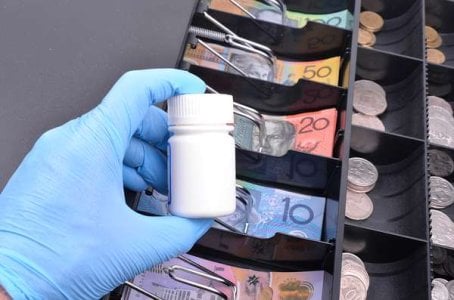From bleak to beat: Affordable cancer pill deals winning hand for Aussies as it joins PBS
- Replies 4
In a monumental stride for healthcare in Australia, a pioneering cancer treatment has been made significantly more affordable and accessible to hundreds of Australians, thanks to its recent inclusion in the Pharmaceutical Benefits Scheme (PBS).
This world-first therapy, which originated from the brilliant minds of Melbourne researchers, is poised to transform the lives of those battling blood cancer.
For individuals like Patrick Foley, who has been waging a war against an incurable blood cancer for over three decades, this news is nothing short of a miracle.
Initially given a mere six months to live, Foley has defied the odds, and now, at 68, he credits his survival to this innovative treatment that he accessed through a clinical trial.
‘It's like playing a card game, where you think you've got a losing hand and you're handed a couple of cards, and then all of a sudden, you've got a winning hand,’ Foley shared, encapsulating the hope and relief that this treatment has brought into his life.

The treatment involves a combination of two drugs, Imbruvica and Venetoclax, which have been used individually to combat chronic lymphocytic leukemia and small lymphocytic lymphoma.
These drugs work synergistically to block specific proteins, effectively targeting and eliminating cancer cells.
Remarkably, the regimen requires just two tablets taken daily for 15 months, eliminating the need for chemotherapy and its associated side effects.
Once patients achieve remission, they can even look forward to a drug-free life.
‘I think it's a huge breakthrough for our patients,’ Dr Con Tam, Head of Lymphoma Services at Alfred Hospital, remarked.
‘That means the cancer is out of mind, and patients can get back to their normal lives.’
This sentiment is echoed by countless patients and healthcare professionals who have long awaited a less invasive and more effective cancer treatment.
The financial barrier that once made this treatment unattainable for many has been dismantled with the PBS listing.
Previously, the cost of the pills was a staggering $12,600 per month, a sum that was simply out of reach for the average Australian.
Now, with the PBS subsidy, concession card holders will pay a mere $7.70, and general patients will pay $31.60, making this life-saving treatment accessible to the masses.
Health Minister Mark Butler has lauded the treatment as ‘remarkable’, with the potential to benefit hundreds of Australians each year.
‘Taking this tablet treatment is just a world away from having to undergo chemo treatment or radiation therapy,’ he declared.
‘This is a remarkable new treatment that will change the lives of as many as 900 patients with lymphoma every year.’
With recent advancements in cancer treatment becoming more accessible, it's a hopeful time for many Australians.
This newly added cancer treatment pill on the Pharmaceutical Benefits Scheme (PBS) is a significant step towards improving healthcare accessibility and supporting patients through their treatment journeys.
In a similar vein, another breakthrough has been made for lung cancer patients. Tecentriq, a treatment that offers new hope, is now also available on PBS.
This addition further underscores the commitment to making essential treatments accessible and affordable, providing a lifeline to many who battle this devastating illness.
These developments mark an important shift in the availability of crucial medical treatments, ensuring that more Australians can access the care they need without the burden of prohibitive costs.
 What are your thoughts on this medical breakthrough? Have you or someone you know had experiences with PBS? How has it impacted your healthcare journey?
What are your thoughts on this medical breakthrough? Have you or someone you know had experiences with PBS? How has it impacted your healthcare journey?
Your stories could provide invaluable insight and support to fellow Australians navigating similar paths. Let's continue the conversation in the comments below and spread awareness about these life-changing developments in our healthcare system.
This world-first therapy, which originated from the brilliant minds of Melbourne researchers, is poised to transform the lives of those battling blood cancer.
For individuals like Patrick Foley, who has been waging a war against an incurable blood cancer for over three decades, this news is nothing short of a miracle.
Initially given a mere six months to live, Foley has defied the odds, and now, at 68, he credits his survival to this innovative treatment that he accessed through a clinical trial.
‘It's like playing a card game, where you think you've got a losing hand and you're handed a couple of cards, and then all of a sudden, you've got a winning hand,’ Foley shared, encapsulating the hope and relief that this treatment has brought into his life.

A groundbreaking cancer treatment has been added to the Pharmaceutical Benefits Scheme (PBS), making it more affordable for Australians with blood cancer. Credit: Shutterstock
The treatment involves a combination of two drugs, Imbruvica and Venetoclax, which have been used individually to combat chronic lymphocytic leukemia and small lymphocytic lymphoma.
These drugs work synergistically to block specific proteins, effectively targeting and eliminating cancer cells.
Remarkably, the regimen requires just two tablets taken daily for 15 months, eliminating the need for chemotherapy and its associated side effects.
Once patients achieve remission, they can even look forward to a drug-free life.
‘I think it's a huge breakthrough for our patients,’ Dr Con Tam, Head of Lymphoma Services at Alfred Hospital, remarked.
‘That means the cancer is out of mind, and patients can get back to their normal lives.’
This sentiment is echoed by countless patients and healthcare professionals who have long awaited a less invasive and more effective cancer treatment.
The financial barrier that once made this treatment unattainable for many has been dismantled with the PBS listing.
Previously, the cost of the pills was a staggering $12,600 per month, a sum that was simply out of reach for the average Australian.
Now, with the PBS subsidy, concession card holders will pay a mere $7.70, and general patients will pay $31.60, making this life-saving treatment accessible to the masses.
Health Minister Mark Butler has lauded the treatment as ‘remarkable’, with the potential to benefit hundreds of Australians each year.
‘Taking this tablet treatment is just a world away from having to undergo chemo treatment or radiation therapy,’ he declared.
‘This is a remarkable new treatment that will change the lives of as many as 900 patients with lymphoma every year.’
With recent advancements in cancer treatment becoming more accessible, it's a hopeful time for many Australians.
This newly added cancer treatment pill on the Pharmaceutical Benefits Scheme (PBS) is a significant step towards improving healthcare accessibility and supporting patients through their treatment journeys.
In a similar vein, another breakthrough has been made for lung cancer patients. Tecentriq, a treatment that offers new hope, is now also available on PBS.
This addition further underscores the commitment to making essential treatments accessible and affordable, providing a lifeline to many who battle this devastating illness.
These developments mark an important shift in the availability of crucial medical treatments, ensuring that more Australians can access the care they need without the burden of prohibitive costs.
Key Takeaways
- A world-first cancer treatment has been added to the Pharmaceutical Benefits Scheme (PBS), making it more affordable for Australians with blood cancer.
- The price of the treatment, involving the drugs Imbruvica and Venetoclax, has dropped from $12,600 a month to $7.70 for concession card holders and $31.60 for general patients.
- The treatment, discovered in Melbourne, has allowed patients like Patrick Foley to go into remission without the need for chemotherapy, reducing side effects and improving the quality of life.
- Health Minister Mark Butler lauded the treatment as ‘remarkable’, with the potential to change the lives of around 900 lymphoma patients every year.
Your stories could provide invaluable insight and support to fellow Australians navigating similar paths. Let's continue the conversation in the comments below and spread awareness about these life-changing developments in our healthcare system.







